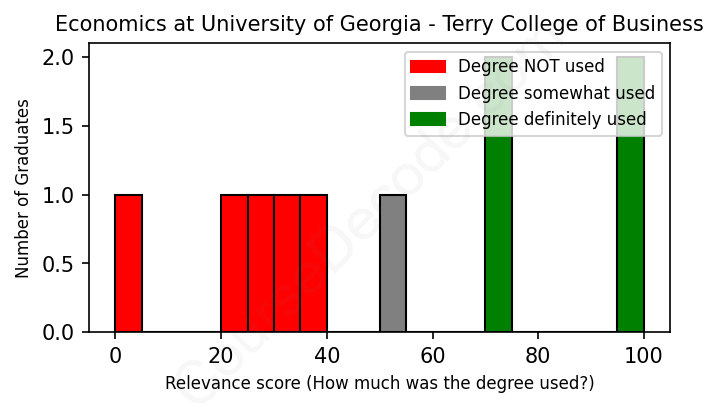
First, some facts. Of the Economics graduates from University of Georgia - Terry College of Business we've analyzed , here's how many have used (or NOT used) their degree in their career:

These are estimates based on AI analysis of 10 LinkedIn profiles (see below).
The verdict? Significantly below average. Overall, with an average relevance score of 51%, Economics graduates from University of Georgia - Terry College of Business have a much lower likelihood (-16%) of finding work in this field compared to the average graduate across all fields:
And for comparison, here's the chart for all profiles we've looked at across all degrees.
Also, after graduating, only 10% of these graduates have pursued further education other than another Bachelor's degree (such as a Masters degree or other), compared to the average across all profiles of 35%. This suggests a Bachelors degree is enough for most Economics graduates, and it's normal to look for work straight after graduation.
See the details:
|
Relevance score: 23% We think this person has NOT gone into a career related to their degree. We think this person has NOT gone into a career related to their degree.
DEGREE INFOGraduated in 2022 from University of Georgia - Terry College of Business with a Bachelor of Business Administration - BBA in Economics. No other secondary education since. JOB HISTORY SINCE GRADUATIONTechnical Service Engineer Epic Jul 2022 - Jun 2023 Administrative Assistant  Im Orthodontics Aug 2023 - Present ABOUTCurrently an administrative assistant at Im Orthodontics.Previously a Technical Services Engineer at Epic Systems. Graduate of The University of Georgia - Terry College of Business with a BBA in Economics and International Business with an Area of Emphasis in Consulting. |
The top 10 most common jobs done by the graduates we've analyzed (ranked most common to least) are:
Here is a visual representation of the most common words in job titles for Economics graduates (this is across all Economics graduates we've analyzed, not just those who went to University of Georgia - Terry College of Business):

Graduates from the University of Georgia's Terry College of Business with a degree in Economics seem to have a pretty interesting career trajectory. Many of them kick off their careers with internships that are closely tied to economics, such as roles at international banks, the UN, and various governmental organizations. This focus on relevant positions often creates a strong foundation for a successful career in economics or finance. For instance, a few graduates transitioned from internships to analyst positions in consulting firms and financial institutions, indicating that they leveraged their early experiences effectively. It looks like they tend to go into entry-level jobs that build on their economic knowledge, often stepping into roles such as analysts or consultants within a couple of years post-graduation.
Fast forward five to ten years, and many of these alumni continue to move up the ladder within their respective fields. It's pretty common to see them ascend from analyst roles to more senior positions, like senior analysts, compliance analysts, or even financial advisors. A few have branched out into related sectors like data visualization or construction management, showcasing the versatility of an economics degree. While there are a couple of cases where individuals took paths that might seem less directly related to economics—like those in food service or administrative roles—most graduates are making significant strides in careers relevant to their studies. Overall, it appears that a degree in Economics from Terry College sets up graduates for solid, impactful careers, often in fields where they can apply their analytical skills and economic knowledge effectively.
Honestly, a Bachelor’s degree in Economics can be a bit of a mixed bag, and that goes for the program at the University of Georgia’s Terry College of Business too. Some students find the core concepts pretty straightforward, especially if you have a knack for math and enjoy analytical thinking. However, other classes, especially those focused on advanced theories and quantitative methods, can get pretty challenging. It's definitely not a walk in the park—there’s some rigorous coursework involved, and you'll need to put in consistent effort to really grasp everything. So, while it's not the hardest degree out there, it does require dedication and a solid work ethic to keep up with the material and excel in your studies.
Most commonly, in the LinkedIn profiles we've looked at, it takes people 4 years to finish a Bachelor degree in Economics.
Looking at the careers of these Economics graduates from UGA, it seems like most of them are on a decent path money-wise, especially considering their internships leading to more stable jobs. The earlier grads, especially those landing roles like Compliance Analysts or Financial Analysts, are likely earning solid salaries, and those at established firms like Accenture and Volkswagen seem to be on the rise too. A few of the newer grads are just starting out, with roles in data annotation and admin positions, which might not pay as much initially, but they could jump up as they gain experience. Overall, while the pay varies by role and experience, most of these folks appear to be building toward solid earnings in the long run.
Here is a visual representation of the most common words seen in the "about" section of LinkedIn profiles who have a Bachelor degree in Economics (this is across all Economics graduates we've analyzed, not just those who went to University of Georgia - Terry College of Business). This may or may not be useful:

Here are all colleges offering a Bachelor degree in Economics (ordered by the average relevance score of their Economics graduates, best to worst) where we have analyzed at least 10 of their graduates: